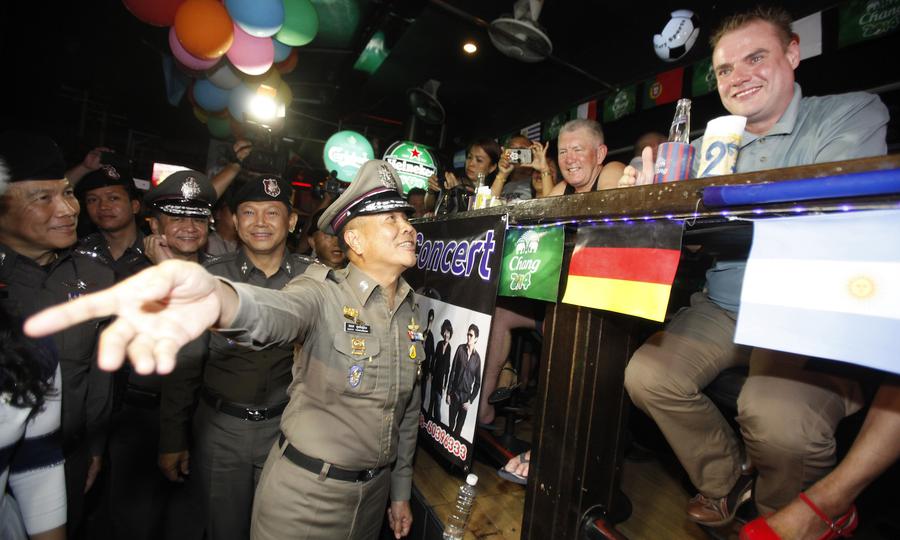New regulations require foreigners report to police each time they leave town, a security measure that could send investors for the exits

Even as Thailand confronts stiff global economic headwinds and declining international tourist arrivals, immigration police have ignited a widening furor by enforcing a tough new monitoring regime on the kingdom’s large foreign business and expatriate community.
Besieged by long queues, software glitches and rising ire, the controversial reporting rules appear sharply at odds with the government’s ambitious promotion of “Thailand 4.0” as a burgeoning, foreign investment-friendly hub for high-tech and new generation industries at its flagship Eastern Economic Corridor (EEC) initiative.
Justified on grounds of shadowy threats to national security, the new monitoring system revives a decades-old law requiring long-stay foreigners or their Thai landlords to report to the Immigration Bureau within 24 hours of returning to their place of residence from a trip of one night or longer elsewhere.

The reporting law, centered on a now-notorious form known as ‘TM30’ (or Immigration 30), was first passed in 1979 but until early this year it only involved hotels automatically forwarding foreign guests’ passport details to immigration authorities.
Its extension to all residences now means that Thai landlords or property-owners accommodating several hundred thousand foreigners, ranging from businesspeople, technical experts, teachers, expatriates married to Thais and retirees, are now required to report their return both after travel abroad and after week-end visits to the beach or business trips to another city within the kingdom.
Long-stay foreigners in Thailand are typically granted a one-year visa, and in many cases an annual work permit, both of which require submitting full details of their residence and place of work. Within the year for which the visa is valid, foreigners are also required to report to immigration authorities every 90 days to reconfirm their domicile.

Widespread and apparently ongoing confusion in the months since the new enforcement of the law in March this year has morphed into frustration and ire in business circles and approaches to immigration authorities by several international chambers of commerce anxious for at least clarity and possibly a revision of the restrictive new regulations.
One Asian diplomat who spoke to Asia Times following a meeting between his country’s Thailand-based business leaders and senior immigration officials noted: “I gather there were a lot of murmurs and the audience raised a lot of objections.”
A mid-August circular to international clients from a Hong Kong-based political and economic risk consultancy reported a more forceful response: “Some foreign staff of local businesses are considering relocating, as the existing requirements for reporting after traveling abroad are already overbearing, time-consuming and expensive. Piling on requirements for reporting domestic movements appears to be a bridge too far. “
An irate Canadian businessman with a Thai wife, two Thai children and 15 years of residence behind him reflected the anger of many unable to pack their bags and leave: “It would actually be simpler if they issued all of us with ankle bracelets to enable 24 hour tracking.” He added: “If I wasn’t married here with kids I would have already moved to Cambodia or Myanmar.”
In attempts to mitigate the angst, Thai Immigration officials have pointed out that reporting can be done on-line or using a mobile-phone application. In the words of the bureau’s Police Colonel Thatchapong Sarawanangkul, who recently addressed a crowded forum of concerned foreigners organized by the Foreign Correspondents Club of Thailand (FCCT), “It’s easier than telling your wife you’re (back) home.”
But a daily stream of letters to Thailand’s main English language daily Bangkok Post and a torrent of far less civil social media postings suggest that in practice accessing and then using the online reporting system is less “Honey, I’m home!” and more “What about divorce?”
The online system involves the issuing of user-names and passwords for Thai property owners to report the movements of what in Thai immigration-speak are termed “aliens” living under their roofs.
Advertised as taking between one and three weeks, the process appears from the outset to have been swamped by the sheer number of people applying. Indeed, in many cases applications simply disappear into cyberspace without any indication if or why forms and document scans submitted have failed to pass muster.
Anecdotal evidence suggests that once the system has been set up, software glitches are common and phone-in helplines respond erratically, if at all.
Further complications arise when Thai landlords, many of whom rent out multiple units, prove reluctant to check on the daily comings and goings of all of their foreign tenants, and in some cases are themselves not even resident in Thailand. Further anger has been stoked by a lack of consistency in how the new rules are enforced.
Some branches of the Immigration Bureau impose fines — ranging from 800 – 2,000 baht (US$25 – US$65) – on both errant Thai property owners and foreign residents who fail to report a return from a short trip away. Others require reporting only after international trips, while quietly conceding that reporting “back in” after an overnight or weekend trip within Thailand is not strictly necessary.
Few, if any, dispassionate observers question the fact Thailand faces daunting challenges posed by a mass influx of foreigners, not least a tsunami of foreign tourists now numbering over 30 million annually.
That, officials say, has included a significant contingent of undesirables involved in an array of organized and freelance criminality, including people smuggling, narcotics trafficking, online financial scamming and credit card fraud, passport forgery and child sex abuse.
In memorable cases in 2012 and 2015 rented houses and condos were used as launch-pads for bomb attacks in Bangkok by foreign terrorists who entered the country on tourist visas.
A law enforcement campaign which has scrambled to respond over the past three years has turned on a pithy slogan coined by a former high-profile Immigration Bureau Chief Police Lieutenant General Surachet Hakpal: “Good guys in, bad guys out!” Well-publicized police dragnets in “nightlife zones” and beyond have scooped up hundreds of visa over-stayers and petty crooks.
“Thailand is caught between a convenient visa regime designed to support an ailing tourist industry on the one hand and, on the other, an overriding need to scan, find and extradite a growing number of foreign criminals who find Thailand an attractive sanctuary or base of operations,” noted one former Western intelligence official with years of experience in the kingdom.
At the nub of the current uproar, however, is the effectiveness of the latest reporting requirements – or whether the daily monitoring of hundreds of thousands of entirely innocent business or pleasure trips by law-abiding foreigners whose addresses and phone numbers are already known to the authorities can usefully contribute to “keeping the bad guys out.”
There is compelling evidence that most foreign criminals enter the kingdom on short-stay tourist visas and then in many cases overstay. Long-stay foreigners who use Thailand as a base for criminal activity, many of whom are married to Thais, make up a smaller proportion.

However, this category of expatriates must go through an already rigorous annual visa renewal process built into which is a one-month screening period between the receipt of an application and the final granting of another year’s stay.
In the case of suspect individuals, that period should – at least in theory — permit liaison with Interpol or police in the applicants’ countries of origin.
Lack of planning and preparation, and inadequate technical and human infrastructure, have also dogged the launch of the new monitoring regime and its online system. “My opinion is that they should have sorted it out first before enforcing the law,“ one panelist at the crowded FCCT forum noted to loud applause.
Failing online reporting, Thai property owners now need to visit immigration branches in person to join day-long queues to present the TM30 form and supporting documentation, including copies of house registration booklets, ID cards and foreigners’ passports.

Even before the new rules were imposed, visits to the kingdom’s immigration headquarters at Chaeng Wattana on the northern edge of Bangkok revealed a system already under siege with queues forming before opening hours and long-suffering officials struggling to process a sea of applicants.
“The system they have introduced appears to rely on massive quantities of paperwork and box-checking but to little obvious effect,” noted the former intelligence official. “Frankly, it’s not real-world law enforcement.”
At the root of the current problem is arguably a reluctance to envisage forward-thinking reform in a national bureaucracy that is both well-entrenched and averse to change.
As one foreign security analyst noted: “It is not a coincidence that in order to deal with real and urgent 21st century problems the Immigration Bureau has resorted to dusting off a law passed four decades ago before the word ‘globalization’ was even thought of. It’s attempting to impose 1979 on 2019.”
Senior Immigration officials who have met with foreign chambers of commerce are so far not inclined to blink. They have stoically repeated the mantra that “the law is the law” and that it will be dutifully enforced.
Teething problems, they insist, will be sorted out, though presumably not before millions of baht in fines have been levied on Thai property owners and foreigners who are slow to adapt to the new restrictive order.
Less than six months into the new regime, it is too early to gauge how much damage will be done to the government’s vision of “Thailand 4.0” and the kingdom’s reputation as a business-friendly destination.

What is clear is that the impact will not be positive and that among regional competitors Vietnam, Singapore and even Cambodia, schadenfreude is likely to be the mood of the day.




